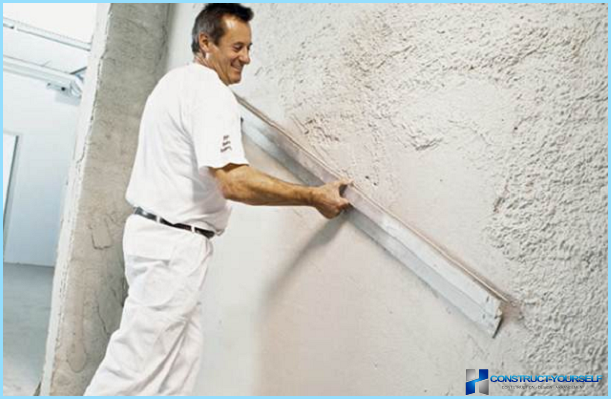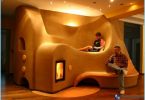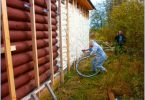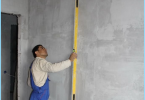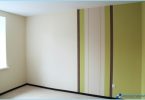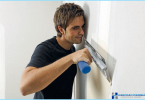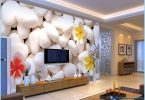The contents
- What good is gypsum plaster
- Gypsum plaster is not always superior to the cement mixture
- Plasterer? the surface of the walls of gypsum plaster on science
Plaster and finishing materials containing calcined calcium sulphate with additives, confidently replacing cement mixture, especially in those cases where the beauty and accuracy of the geometry of the walls prefer instead of the strength and cheapness of the material. To recall the drywall, how many different possibilities of its use in the decoration of the walls. Over the past two decades, the volume of consumption of gypsum materials for one square meter in the decoration of the walls increased by an order.
What good is gypsum plaster ↑
Rarely, when the walls in the apartment without the expense of plaster on mTwo the finished surface. Use of gypsum material accounts for the most part not because of its exceptional decorative, sanitary or environmental properties. When used together, plaster cement complemented by a list of specific technological properties:
- Due to high plasticity and fine grain fine finish plaster has an almost glossy texture, and this quality is easily achieved with your own hands, which is not true of cement based;
- With proper application of the primers and the presence of plasticizers in the mixture wall you can plaster with your hands at a thickness of a layer of gypsum plaster is not more than 1 mm, without any loss of quality finishing;
- In the technology of plastering work get excellent adhesion, which allows it to render walls of solid concrete or with concrete ties.
- Gypsum plaster mixture has a low shrinkage on mTwo and dries quickly, is often the only suitable for plastering a concrete slab ceiling of the apartment.
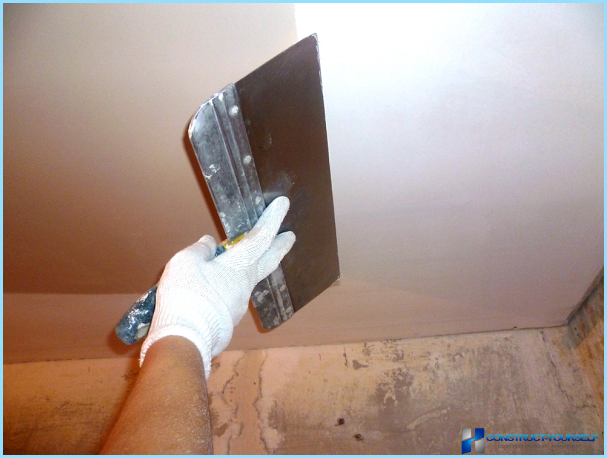
It is believed that gypsum plaster and blocks increase the fire resistance of the walls. This factor somehow pay very little attention. With long-term intensive heating, for example, at the junction of the twisting of the wires when overloaded, conventional plaster swells and cracks if the plaster gypsum – in the best case, it will lose color and darken much.
Gypsum plaster is not always superior to the cement mixture, ↑
Pure gypsum has a lower strength and considerable shrinkage, dries quickly and is extremely sensitive to the exact moisture content. Therefore, gypsum-based applies exclusively to plastering the interior. Small disadvantages of plaster should be known and considered if you wish to plaster the walls of an apartment or house with your own hands.
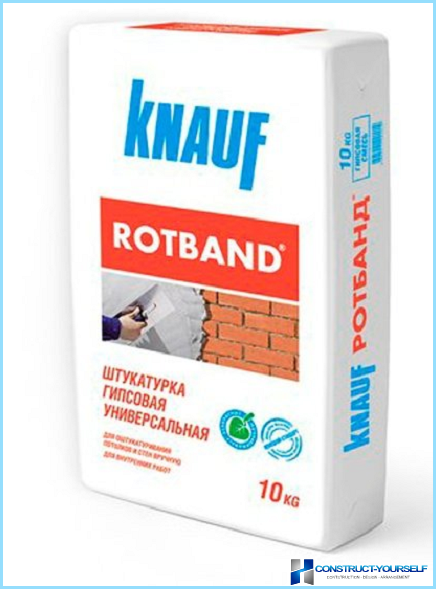
In addition, before work count with my hands the consumption of the material – exactly how many it is necessary to buy ready-made dry plaster to plaster one mTwo wall with a 10% reserve. To buy material for the future makes no sense, plaster-based well «pulls» moisture from the air and loses its strength, how much would you have Packed.
Plasterer? the surface of the walls of gypsum plaster on science ↑
Most often we plasterer? wall plaster plaster for reasons of economy and desire to take their hands of the old plastered wall surface to a more or less flat, with smooth surface. If you make their hands all as required by the technology, the costs of Finance for one mTwo will be much less and easier than to decorate the walls with sheets of drywall or re-plaster the walls from scratch.
Preparing ↑
Before starting plastering work with their hands will need to find out three fundamental values and strictly adhere to them, making the plastering of the wall:
- You need to learn from the instruction or verify in practice, which is exactly the desired water flow, and how much plaster mixture of plaster of maximum plasticity and strength. It is often believed that when plastering the walls no matter how much excess water transfused into the solution, the strength will decrease, but not by much. In reality, necessary to maintain optimum proportions for plaster base, especially if you have to work with very thin layers;
- To establish exactly how much time is suitable for use prepared solution, especially if you intend to plaster or leveling a large area of the walls. If you try to plaster already pozalusta mixture, you will not be able to correctly align the surface;
- To calculate the approximate consumption of the mixture on one mTwo the plastered surface, and also, how much mTwo area you need to plaster.
The main stage of the preparation of the walls before trying to plaster is setting landmarks-lighthouses. In the case that the layer of plaster of 10 mm is the two T – shaped strips of rigid plastic or aluminum sewn vertically on the wall. Perpendicular shelf strips this will ensure uniform thickness of plaster.
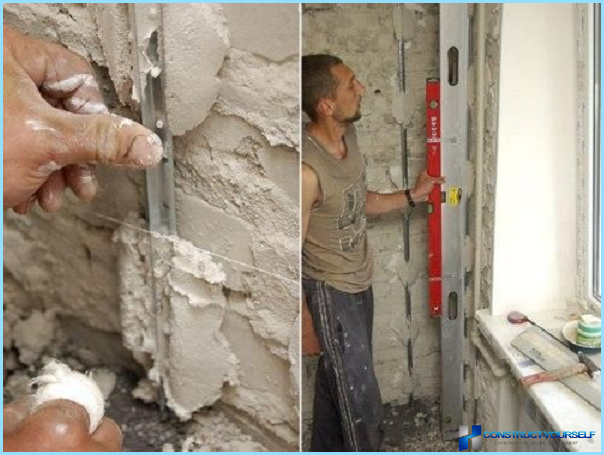
Targets should be mounted on the wall evenly, at a distance of not more than a meter, and align the fishing line, stretched horizontally across the length of the wall. At large distances, it will require longer and proper rubbing tool with a hard working surface. Use visual material in the video
For thin layers of plaster, 2-3 mm, plaster has no reference points, control the provisions of the governing instrument, the rules on tight line, using a level.
Work, is it easy to plaster, gypsum plaster ↑
Working with plaster is much easier consumption of the solution per one mTwo less, but the process requires efficiency and accuracy. The solution itself is lighter, dries quickly, often plastering the wall the plaster with a difference in thickness up to 50 mm, without «tricky» reinforcing fixtures, and materials.
The surface does not require special training, as long as the basis for applying the plaster was smooth and held firmly on the wall, on the surface of a plaster solution dries faster. If there is «hernia» or «bumps» of brick, it is better to cut or knock down.
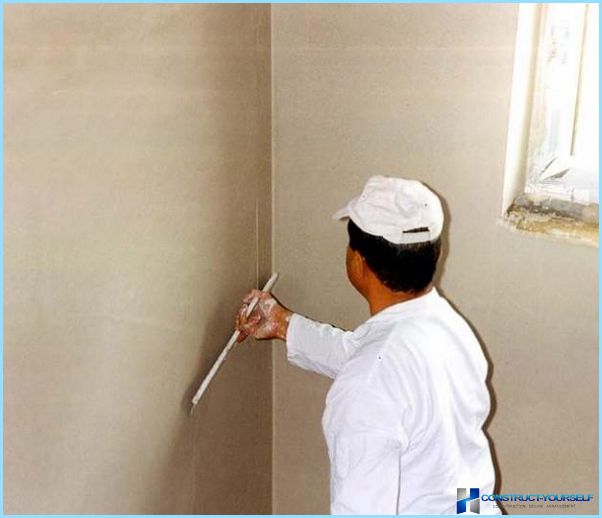
If you intend to plaster a concrete slab or ground layer cement plaster, pre-treated very gently thick solution of acrylic primer. For applying plaster mixture on the brick you can do without the consumption of soil. Especially porous surfaces, easy-absorbent, is also better primed. More details of the process can be seen in the video
Make a batch in plastic containers from the calculation of the consumption per liter or kilogram of water – two pounds of dry mix. In, pour it in a container of water gradually poured the mixture and twist machine / whisk with an electric drill. Once the mixture has acquired a homogeneous, the batch is sent «relax» and begin plastering from the bottom left or right corner – it’s whatever you like. Often go in the direction of bottom-up, from left to right.
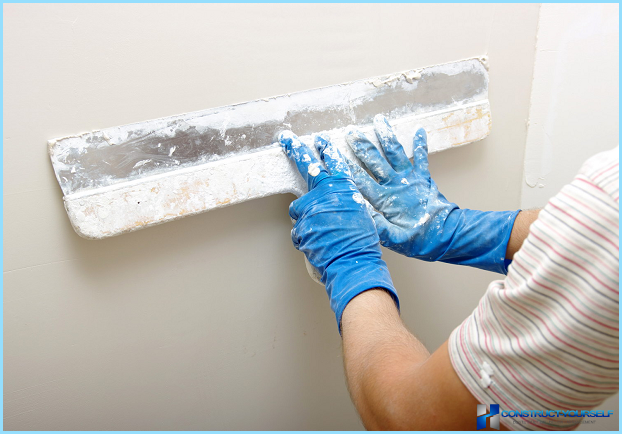
Pay attention to the features of work ↑
Plaster dries up to 5 days, depending on temperature and humidity. The room should be not less than 7onWith the heat, otherwise the surface would be highly undesirable wet layer of condensate.
Due to the high plasticity of the process of smoothing is very easy. If you notice that the surface was scratched by the tool, we need to stop plastering the wall because of the setting solution. All remaining flaws and irregularities you will need to modify putty and sanding after the final coat. If you want glossy surface quality of the wall – use the tips from the video
The most difficult is to plaster corners and the surface of the wall adjacent to the ceiling. In these zones most often geometry of masonry, sometimes they have to beat and grind manually.
Any insights wiring must be carefully insulated and close the hinged caps. After drying, the plaster caps to remove and connect to the dismantled devices. In addition, you cannot close by plastering mass of exposed contacts, any stress. The composition of the plaster when wet can cause a short circuit. In addition, plastering the surface on which there are a variety of sharp metal fragments, very inconvenient, moreover, the composition adheres poorly to metal surfaces.
Conclusion ↑
If you choose – than to plaster walls inside the house, the best option would be stucco, except for basements and rooms with high humidity. In addition, a plaster surface, it is better to cover the decorative or liquid plaster. Though manufacturers go on about the safety of the cast, who are unlikely to gypsum dust from the surface of the plastered walls add health.

